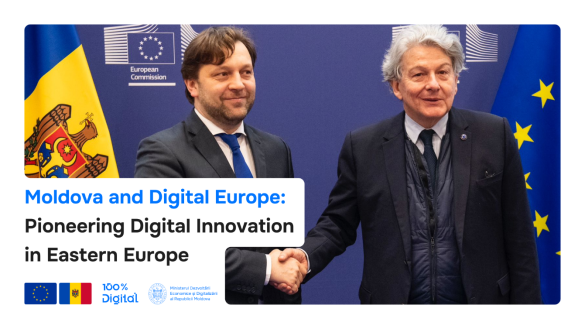Moldova and Digital Europe: Pioneering Digital Innovation in Eastern Europe

Chisinau, Moldova – 23.02.2024: Moldova takes a new step in its journey towards Europe’s next fully digitalized, most investor-friendly economy by joining the Digital Europe Program. This event, marked by the signing of the accession agreement between European Commissioner Thierry Breton and Moldova’s Deputy Prime Minister and Minister for Economic Development and Digitalization, Dumitru Alaiba on February 19, signifies the nation’s unwavering commitment to digital advancement.
This move is set to strengthen the nation’s digital infrastructure and cybersecurity, facilitating the widespread adoption of the latest technologies across various sectors. Complemented by Moldova’s sweeping recent fiscal and labor market reforms, the accession sets the stage for an era of accelerated digital transformation, market competitiveness, and attractive investment opportunities.
Preceded by the approval of Moldova’s Digital Transformation Strategy for 2023-2030 this represents a significant leap forward for the country’s digital development. Moldova’s strategy directly aligns with the European Union’s digital agenda, facilitating digital integration and access to resources and expertise. This alignment promotes interoperability, compatibility, and collaboration with EU nations, fostering economic growth and development.
The strategy prioritizes citizen-centricity, aiming to improve everyday experiences with digital services. This translates to increased efficiency, transparency, and accessibility of public services, leading to improved trust and engagement with the government. The document goes beyond just digitizing services. It aims to develop a robust and competitive ICT sector, fostering innovation and entrepreneurship: creating jobs, attracting investment, and strengthening the foundation for a sustainable digital economy. Access to the program’s €7.5 billion budget provides crucial financial resources for implementing the strategy.
A cornerstone of Moldova’s economic strategy aimed at producing year on year growth, besides digitalization is its progressive fiscal policies, is the extension of one of its most successful projects – Europe’s first IT park with a single 7% tax rate for IT companies. This initiative is tailored to stimulate ICT sector growth and attract foreign investments. The sector’s contribution to the GDP has seen a significant rise from 1.5% in 2016 to 5.1% in 2022. In terms of fiscal contributions, Moldova’s IT companies have paid a substantial 156.342 million euros in taxes between 2018 and 2022. The country boasts over 1,650 resident IT companies, with a notable 20,900+ employees, reflecting a robust and growing tech ecosystem. Furthermore, the IT sector’s turnover reached an impressive 741 million dollars in 2023.
The introduction, in 2023, of a 0% income tax on reinvested profits is a bold move by the Moldovan government. This policy is designed to encourage businesses to reinvest their earnings back into the company. This tax incentive is particularly attractive to startups and established businesses looking to expand their operations, as it provides a significant financial advantage.
In the past few years, the Eastern-European country has positioned itself as a leader in the adoption and implementation of a digital economy, with a massive increase of digital G2B services. Over the course of a single year, the % of digital G2B services rose by more than 27%, currently at 51%, with an ambitious target to increase this figure to 75% by the end of 2024. This is followed by a commitment to ensure every citizen has access to their digital identity, accessible through remote identification and eKYC, and the option of anyone to set-up a business remotely with just a few simple clicks. This initiative reflects the government’s commitment to streamlining services, enhancing transparency, and improving overall efficiency. Additionally, a new reform has been implemented for Moldova’s labor market, which has undergone significant liberalization, allowing citizens from 47 countries to work in Moldova without a work permit.
It is envisaged that the accession to the Digital Europe Programme will contribute to creating a synergistic environment for innovation and growth at the European level, representing a unique opportunity to unlock the country’s digital potential, bolstered by its forward-thinking fiscal and labor policies. This approach positions Moldova as a hub for digital transformation and an attractive destination for global investors and talent.
